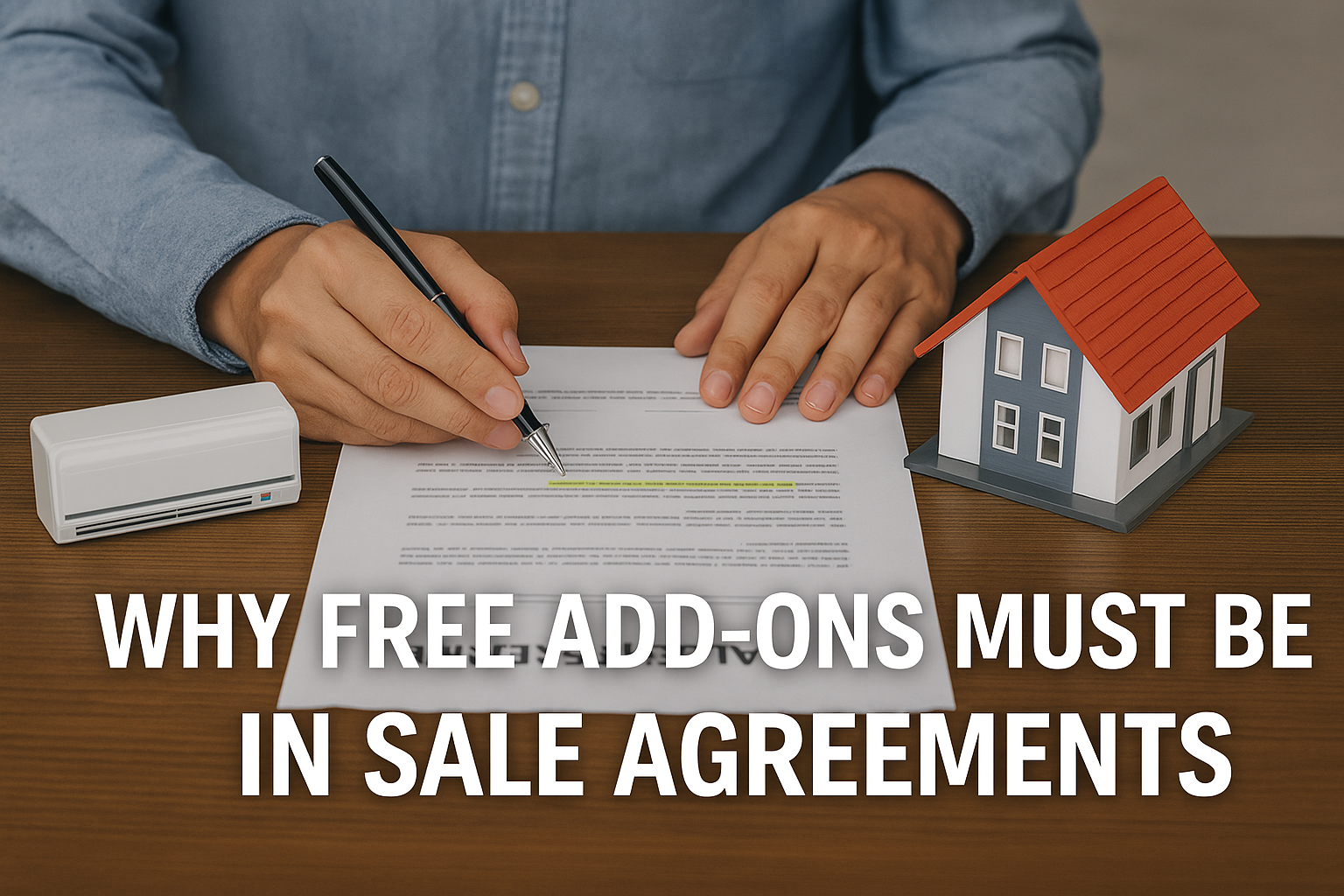Why Developers Must Clearly Mention Free Add-Ons in Sale Agreements
When purchasing a property, developers often entice buyers with free add-ons in sale agreements—such as modular kitchens, air conditioners, or parking spaces. While these offers seem appealing, it’s essential to ensure that all promised amenities are explicitly mentioned in the sale agreement to avoid future disputes.
These “freebies” might seem like a great bonus at the time of booking. However, if they’re not included in your sale agreement, they might as well be empty promises. Let’s unpack why it’s crucial to get everything in writing — especially those tempting “free” offers.
What Are Free Add-Ons?
Free add-ons can include a variety of offerings from developers to sweeten the deal. These could be:
- Modular kitchen fittings
- Air conditioners
- Wardrobes or wooden flooring
- Free parking space
- Clubhouse memberships
Now, imagine this — you’re at the developer’s office, wading through brochures and sipping on complimentary coffee, when the salesperson leans in and says, “If you book today, we’ll throw in a fully loaded modular kitchen — free of cost!”
That sounds amazing, right? But unless it’s in your sale agreement, it doesn’t legally exist.
Why Verbal Promises Don’t Count
We all love a good deal, and who doesn’t like a “limited time offer”? But here’s the catch — verbal offers are not legally binding in most cases. You can’t rely on what the builder or salesperson says unless it’s documented.
Let’s consider Rohan, a homebuyer who recently shared his experience. The developer verbally promised him an air-conditioned bedroom and modular fittings, only to do a vanishing act once the flat was handed over. When Rohan asked about the promised amenities, the response was simple — “It’s not in the agreement.”
Can you guess what happened next? Not much. Without proof in the agreement, Rohan couldn’t take legal action. He was left with no option but to upgrade everything on his own, costing him a small fortune.
Lesson Learned:
If it’s not written down, it never happened.
Why Should Free Add-Ons Be Part of the Sale Agreement?
Let’s face it — home buying isn’t just about glossy brochures and show flats. It’s a legal transaction. And like any solid contract, transparency is everything.
When developers include these add-ons in the registered sale agreement, it offers several key benefits:
- Legal Protection: You can enforce the terms if there’s a breach or false promise.
- No Misunderstandings: Everyone is on the same page — literally.
- Better Documentation for Future Resale: Buyers love upgrades and you can show proof of them.
- Tax & Valuation Clarity: When add-ons are documented, they are considered in asset value calculations.
What the Experts Say
Legal professionals and real estate advisors consistently stress one thing — have everything legally documented.
According to real estate law experts, the sale agreement is the definitive document that outlines what a buyer is entitled to receive. Courts and consumer forums rely on these agreements to resolve disputes. If something is missing, you might not have a leg to stand on.
So, if your agreement says “bare shell flat” and doesn’t mention any of those delightful add-ons, you’re out of luck — even if the salesperson promised a mini-palace.
Tips to Protect Yourself as a Homebuyer
Now that we know why documentation is key, let’s explore what steps you can take:
1. Insist on written communication
Before you sign anything, ask for a detailed breakdown of what’s included — and get it on official letterhead or via email from the builder.
2. Review the sale agreement thoroughly
Don’t just skim through. Ensure every promise — whether it’s a free water purifier or covered parking — is clearly mentioned.
3. Consult a legal expert
It’s always wise to have a legal professional go through the documents before you sign. They can catch missing clauses or vague language.
4. Don’t rely on brochures or advertisements
Marketing materials are often riddled with disclaimers. Only the agreement holds legal value.
5. Ask questions
Don’t feel shy about asking the developer to clarify vague language. It’s your hard-earned money, after all.
What Happens If an Add-On Isn’t Delivered?
If you’ve got proof — such as emails or a signed agreement — and the developer fails to keep up their end of the bargain, you can:
- File a consumer complaint
- Approach the RERA (Real Estate Regulatory Authority)
- Pursue legal action
But again, these will only be effective if you have your paperwork in order.
Conclusion: Don’t Just Take Their Word For It
Buying a flat is too important (and expensive!) to leave anything to chance. Free add-ons often tip the scale when deciding between two properties. But don’t let those “freebies” become false promises.
The golden rule? **If it’s not in the agreement, it doesn’t exist.**
So the next time a developer offers you something extra — smile, nod, and then say: “Great! Please put that in writing.”
Final Takeaways for Smart Homebuyers
- Always get every promise in writing.
- Make sure the sale agreement reflects the complete deal — including free add-ons.
- Consult a lawyer before signing anything.
- Don’t rush. Take your time to review all documents.
In the end, honesty and clarity benefit both sides — developers build trust, and buyers get what they paid for. That’s how you build not just homes, but peace of mind.
Thinking of buying a flat soon? Make sure your agreement says it all… and then some!
Have you ever faced a situation where a promised freebie was missing after possession? Share your story in the comments — your experience could help someone else!
- homebuyer rights
- real estate agreements
- flat purchase tips
- legal property documentation
- free add-ons in property deals

